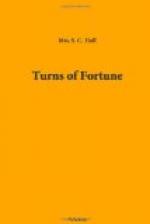Oh! how utterly groundless is the idea, that in our social state, where one human being must so much depend upon another, any man, neglecting his positive duties, can be called only “his own enemy.” What misery had not Dr. Adams’s neglect entailed, not alone on his immediate family, but on that of his brother. Besides, there were ramifications of distress; he died even more embarrassed than his brother had at first believed, and some trades-people were consequently embarrassed; but the deep misery fell upon his children. Meanwhile, Mrs. Dr. Adams had left Repton with her younger children, to be the dependants of Mary in London.
It was not until a fatal disease had seized upon her mother, that Mary ventured to appeal again to her uncle’s generosity. “My second brother,” she said, “has out of his small means remitted her five pounds. My eldest brother seems altogether to have disappeared from amongst us; finding that his unhappy presence had occasioned so fatal a separation between his mother and you—a disunion which I saw was the effect of many small causes, rather than one great one—he left us, and we cannot trace him. This has broken my poor mother’s heart; he was the cherished one of all her children. My youngest brother has been for the last month an inmate of one of the hospitals which my poor father attended for so many years, and where his word was law. My sister Rosa, she upon whom my poor father poured, if possible, more of his affection than he bestowed upon me—my lovely sister, of whom, even in our poverty, I was so proud—so young, only upon the verge of womanhood—has, you already know, left us. Would to God it had been for her grave, rather than her destroyer!—a fellow-student of that poor youth, who, if he dreamt of her dishonour, would stagger like a spectre from what will be his death-bed to avenge her. Poverty is one of the surest guides to dishonour; those who have not been tempted know nothing of it. It is one thing to see it, another to feel it. Do not think her altogether base, because she had not the strength of a heroine. I have been obliged to resign my situation to attend my mother, and the only income we have is what I earn by giving lessons on the harp and piano. I give, for two shillings, the same instruction for which my father paid half a guinea a lesson; if I did not I should have no pupils. It is more than a month since my mother left her bed; and my youngest sister, bending beneath increased delicacy of health, is her only attendant. I know her mind to be so tortured, and her body so convulsed by pain, that I have prayed to God to render her fit for Heaven, and take her from her sufferings. Imagine the weight of sorrow that crushed me to my knees with such a petition as that. I know all you have done, and yet I ask you now, in remembrance of the boyish love that bound you and my father together, to lessen her bodily anguish by the sacrifice of a little more; that she, nursed in the lap of luxury,




